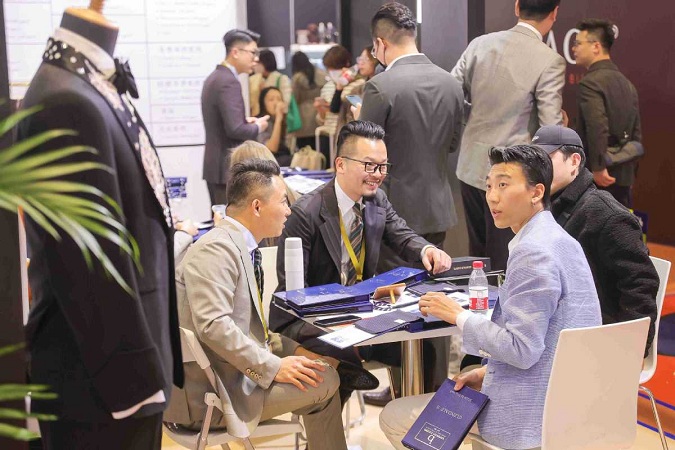

Visitors discuss products during the spring edition of the Intertextile Shanghai Apparel Fabrics trade fair held at the city's National Exhibition and Convention Center on March 29, 2023. [Photo provided to chinadaily.com.cn]
Messe Frankfurt GmbH, one of the world's largest trade fair and event organizers by sales revenue, is set to hold more than 40 business exhibitions across China to meet the demand of local companies in promoting their brands and products, according to its top executive.
Many opportunities come from China's moves to optimize its COVID-19 response, introduce foreign trade and consumption stimulation packages and support the private sector, said Wolfgang Marzin, the group's president and CEO.
The German company will organize several major trade fairs and events, such as the Guangzhou International Lighting Exhibition in June, the China (Shenzhen) Cross-Border E-commerce Fair in September in Guangdong province, the Shanghai International Trade Fair for Automotive Parts, Equipment and Service Suppliers in November and the China International Trade Fair for Heating, Ventilation, Air Conditioning, Sanitation and Home Comfort Systems in May in Beijing.
Marzin, who attended the spring edition of the Intertextile Shanghai Apparel Fabrics fair held at the city's National Exhibition and Convention Center in late March, said China has always been and will continue to be a vital market for trade, adding Messe Frankfurt is keen to put on more high-end industrial and trade fairs in China in the coming years.
Apart from promoting foreign trade, investment, the digital economy and healthcare-themed events, many Chinese companies from sectors like electronics, automotive, green development, chemical and consumer goods have seen surging demand for exhibitions in recent years.
"Even though China's convention and exhibition industry was affected by the COVID-19 pandemic, the sector is facing a new round of growth opportunities from supportive policies and digital tools," Marzin said, noting the industry is naturally connected to the upstream and downstream of various industries.
He added this will not only lead the industry to a more comprehensive and higher-end development direction, but it will also act as a bridge in global industrial and supply chains.
As the Regional Comprehensive Economic Partnership pact has created favorable conditions to boost two-way investment and foreign trade, Marzin predicted companies from signatory countries will have more demand to participate in various trade shows in the Asia-Pacific region in the years ahead.
Zhao Ping, vice-dean of the academy of Beijing-based China Council for the Promotion of International Trade, said judging from the recovery of China's convention and exhibition industry this year, the effects of exhibitions in various industries have generally exceeded expectations.
As of the end of March, the CCPIT received 519 applications from domestic organizers for overseas exhibitions this year. These trade fairs will be held in 47 countries, including the United States, Germany, France, Japan, Thailand and Brazil.